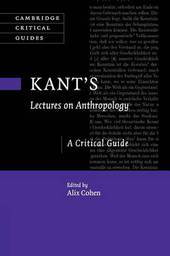
|
Kant's Lectures on Anthropology: A Critical Guide
Paperback / softback
Main Details
| Title |
Kant's Lectures on Anthropology: A Critical Guide
|
| Authors and Contributors |
Edited by Alix Cohen
|
| Series | Cambridge Critical Guides |
|---|
| Physical Properties |
| Format:Paperback / softback | | Pages:288 | | Dimensions(mm): Height 228,Width 153 |
|
| Category/Genre | Philosophy - epistemology and theory of knowledge |
|---|
| ISBN/Barcode |
9781316621547
|
| Classifications | Dewey:301.01 |
|---|
| Audience | | Professional & Vocational | |
|---|
| Illustrations |
5 Tables, black and white
|
|
Publishing Details |
| Publisher |
Cambridge University Press
|
| Imprint |
Cambridge University Press
|
| Publication Date |
1 September 2016 |
| Publication Country |
United Kingdom
|
Description
Kant's lectures on anthropology, which formed the basis of his Anthropology from a Pragmatic Point of View (1798), contain many observations on human nature, culture and psychology and illuminate his distinctive approach to the human sciences. The essays in the present volume, written by an international team of leading Kant scholars, offer the first comprehensive scholarly assessment of these lectures, their philosophical importance, their evolution and their relation to Kant's critical philosophy. They explore a wide range of topics, including Kant's account of cognition, the senses, self-knowledge, freedom, passion, desire, morality, culture, education and cosmopolitanism. The volume will enrich current debates within Kantian scholarship as well as beyond, and will be of great interest to upper-level students and scholars of Kant, the history of anthropology, the philosophy of psychology and the social sciences.
Author Biography
Alix Cohen is Chancellor's Fellow at the University of Edinburgh. She is the author of Kant and the Human Sciences: Biology, Anthropology and History (2009), and has published articles in journals including the Canadian Journal of Philosophy, Kantian Review, History of Philosophy Quarterly and the British Journal for the History of Philosophy.
Reviews'The volume addresses many important topics in Kant's anthropological writings and does so in a scholarly, philosophically sustained, and accessible manner. Alix Cohen is to be thanked for putting this excellent collection of essays together; it will prove a valuable resource to students and teachers of Kant's philosophy and is bound to attract the attention of intellectual historians and political philosophers.' Katerina Deligiorgi, University of Sussex
|